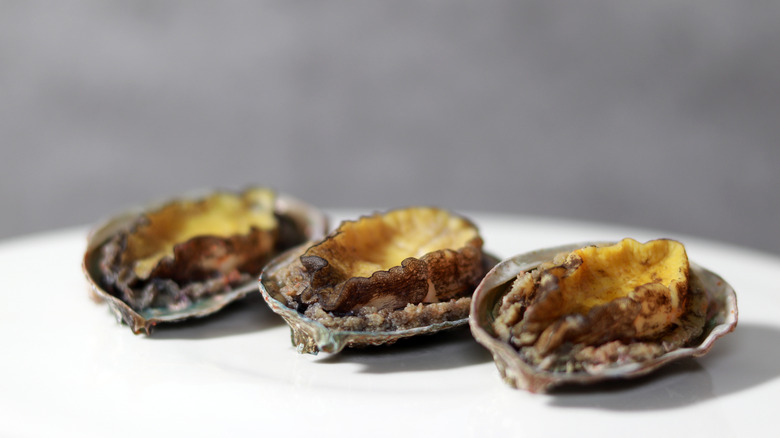The Once Popular Seafood You'll Likely Never Eat In America
Once upon a time, Indigenous people living off the coast of California and Mexico's Baja Peninsula regularly ate white abalone. The area's inhabitants fished for this delicious and nutritious mollusk for over 7,000 years, and some groups also used its beautiful shells for important religious ceremonies or celebrations. But human beings have a penchant for ruining everything, especially when we get greedy without thinking of the consequences.
After European colonization and the Industrial Revolution, the market for abalone grew. Fisheries in the 19th and 20th centuries quickly depleted populations of the sea snail to meet this insatiable demand. When one population completely disappeared, they moved onto the next. And the next, and the next. The California government finally put a stop to the madness by closing every abalone fishery in 1997. Four years later, white abalone was added to the Endangered Species Act and consuming it became illegal. The damage, however, was already done. Some colonies of this type of abalone (which is only found in this region of the world) show 99% fewer individuals than in the 1970s. Adults need to be at least three feet from each other to successfully spawn, but a lower population reduces the chance of proximity. This, in turn, makes it difficult for the species to breed and replenish its numbers. Some scientists believe white abalone may go extinct without human intervention. Great job, humanity.
The ethics of consuming abalone
Climate change, pollution, and environmental conditions pose a threat to white abalone, but overfishing has been one of the biggest factors in this species' demise. The same thing happened with sea turtles, which we happily over-ate in the U.S. until they were declared endangered. Even with modern laws, we seem to be eating animals to extinction, as is the current case with eels. In short, we need to be careful about what we put on our plates before we turn the ocean into a mass graveyard. Given this, should you completely give up eating abalones? Mostly, yes.
White abalones are absolutely a no-go. Eating them is not only a crime, but would also contribute to the irreversible disappearance of this important species that brings biodiversity to the California coast. Avoid other types of abalone from the West Coast as well — every single species in the area is endangered. The situation is similar around the world, with 15 of the 21 commercially fished abalone species being classified as threatened. If you're worried about contributing to overfishing, it's better to simply skip consuming this seafood altogether.
This might not always be easy. For instance, abalone sauce is sometimes used to prepare tofu dishes and other foods in Asia, so you could eat the mollusk without even noticing. Still, you can minimize your impact by intentionally going for more sustainable seafood options.

